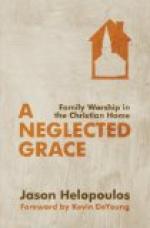Christian parents! what think you of this? When bending over the grave of a beloved child, with the cherished hope of meeting it in heaven, how would such intelligence as this startle you from your dream of reunion there, and cast a deep pall of desolation around your sorrowing hearts? Does not the parent’s faith forbid the intrusion of a doctrine so revolting as this? Though you have been in your home, the divinely appointed representative of your child, and in its baptism exercised faith in its behalf, on the ground of those natural and moral relations which the Lord has constituted between you and your child, yet in this startling dogma of the enemies of its baptism, you find a virtual denial of the existence of such moral relations and parental vicarage; yea, a denial of parental stewardship and of the religious ministry of the Christian home. The revulsion with which the Christian heart receives such a denial of infant baptism is at least a presumptive evidence against it. But we think enough has been said to lay the foundation of some practical comments upon the subject of Christian baptism.
If it is a fact that infants are proper subjects of baptism, then it is the duty of Christian parents to have them baptized. It is not only a duty, but a delightful privilege, to consecrate them to God in a perpetual covenant never to be forgotten, regarding them as the members of the kingdom of Christ, and so called to be God’s children by adoption and grace.
Their baptism involves many parental duties and responsibilities. If it is both a sign and a seal of the covenant of grace, and a means of grace, so that the parent’s faith, in their baptism, places the child in covenant relation to the Incarnate Word, through the life-giving Spirit, then it is plain that the parent is bound to secure for the child those blessings which that baptism contemplates, and which hang upon the exercise of a receiving faith. This sacrament gives the child a churchly claim upon parental interposition in its behalf, in all things pertaining to its spiritual culture,—in a true religious training, in a proper direction in the use of the means of grace, in a holy Christian example. Here it is the parent’s duty to represent the church, to act for the church in religious ministrations to the child, to be the steward of the church in the Christian home, to rear up the child for a responsible membership.
No parent, therefore, who neglects the baptism of the child, can have “the answer of a good conscience towards God.” If we are satisfied to have our homes separate from the church; if we are satisfied with individualistic, disembodied, unassociated christianity,—a religion that owns no church, but which has its origin, root and maturity in the self-conscious activity of the individual, we may then neglect this duty. But in doing so, to be consistent, we must also discard the sister ordinance of the Lord’s supper, yea, all the churchly means of grace; yea, the church itself; for why repudiate one ordinance,—one idea of associated Christianity, and not all the others?




